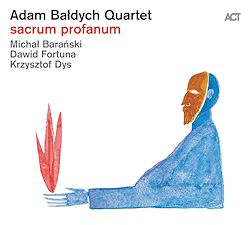 BUY NOW AmazonUK AmazonUS |
ADAM BALDYCH QUARTET Sacrum Profanum |
Adam Baldych (violin: renaissance violin): Krzysztof Dys (piano; prepared upright piano; toy piano)
Michal Baranski (bass): Dawid Fortuna (drums; crotales; gran cassa)
Recorded at Clouds Hill Recordings Studio Hamburg, November 20 and 21, 2018
Spem in alium (Thomas Tallis / arr. by Baldych & Dys)
O virga ac diadema (Hildegard of Bingen / arr. by Baldych & Dys)
Profundis (Adam Baldych)
Concerto For Viola And Orchestra (Sofia Gubaidulina)
Bogurodzica (writer unknown, from the 13th century)
Miserere (Gregorio Allegri / arr. by Baldych & Dys)
Repetition (Adam Baldych)
Longing (Adam Baldych)
Miracle Of Ď87 (Adam Baldych)
Jardin (Adam Baldych)
Adam Baldych freely admits that this is a concept album centring on his cultural exploration of sacred music from the Western tradition, from Hildegard von Bingen to the contemporary Sofia Gubaidulina. He has also included a quintet of his own pieces, written whilst he was working on this project. He has armed himself with a Renaissance fiddle and drummer Dawid Fortuna plays crotales, gongs and gran cassa whilst pianist Krzysztof Dys plays, in addition to piano, a prepared upright piano and a toy piano. This increases the variety of textures and colours available to Baldych and his band.
He opens with Thomas Tallisí Spem in alium subtley improvising over the well placed, deftly nuanced bass of Michal Baranski. Itís cumulatively moving to hear, though I daresay many admirers of Baldych will find things too austere and spare for their liking. I donít. Similarly there is a greater admixture of jazz in his Hildegard setting, as his violin floats ethereally through the musical textures. The anonymous piece Bogurodzica is a catchy one with a ready supply of ardent percussion. Perhaps one of the very best pieces in the album is the treatment of Allegriís Miserere. It could easily have been sentimentalised or exaggerated but there is a sense of underplaying going on, in which deft instrumental placement and the sense of space thus generated does much of the expressive work.
His own pieces include a fast-ish Profundis, a more straight-ahead piece with affirmatory elements. Repetition opens with solo fiddle before a taut bass solo and some busy undulating piano kick thing on and thereís a reflective ballad in the shape of Longing, a duet for the violinist and Dys. Elements of folklore have been, thus far, thin on the ground but they do emerge on Miracle of í87, with its fast and fluid violin improvising; itís an attractive number, splendidly played by the quartet. Finally, thereís the catchy Jardin to conclude things, another Baldych composition of stature.
Itís self-definably the case that his interest in sacred music has infiltrated his compositions here. Itís still the case, though, that there sound like two things going on; not sacred and secular exactly, but more a case of sacred and a sequence of five more overtly jazz-based pieces. They donít always sit securely together, though perhaps thatís more a stylistic matter. The all-Polish quartet Ė and itís the first time that he has recorded for ACT with an all-Polish ensemble Ė play excellently throughout and are full of subtle nuance and colour.
Jonathan Woolf